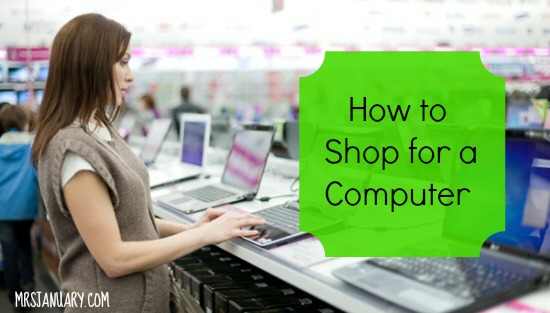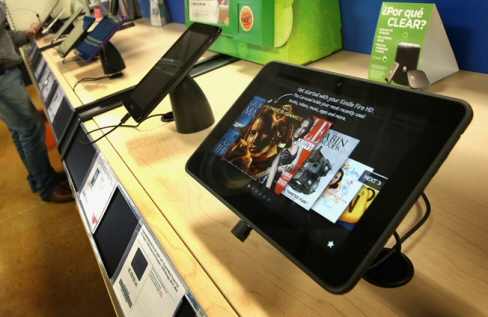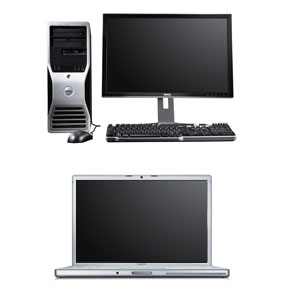How to shop for a computer
Knowing how to shop for a computer is key if you want to get a good deal.
If you’re in the market for a new computer, you’ll be able to find the best deals around this time of year. Whether you’re looking to buy a computer for home, school, or business here are some tips on how to shop smart.
How to shop for a computer
Question: What is it for?
Before deciding on what type of computer and which model you would like to purchase, think about what your requirements and needs will be. If your primary use is to take notes in a class or meeting, you probably don’t need the computer with the fast processor (CPU).
Instead, a good system with good battery life and includes software bundles like Microsoft Office would be better suited to your purpose. If you’re into media, you might want a computer with a faster CPU or a video card that comes pre-installed with the system.
Set a budget
Remember that price does not always reflect superiority, especially during the month of August & September (thanks to sales). Set your budget and stick to it. Don’t start shopping prior to knowing your firm budget. You can easily be swayed by features of computers, and you don’t want to spend beyond your means.
Choose an operating system
The two main competitors are Windows and Mac, and there is also Linux (less mainstream). The easiest way to choose the right computer is to choose between Windows, Mac, or Linux and then narrow it down from there.
If you’re on a tight budget, Windows computers are cheaper than Mac and Linus computers, and there are certain features that are better for a fraction of the price.
If you’re already a Windows user, it may be easier to continue using Windows, and the same goes for Mac users. However, don’t be afraid to switch – it just might take a little while to get used to it.
Desktop or laptop?
Deciding whether you will need a desktop or laptop will be based on the primary use. Laptop computers are more popular nowadays due to the fact that most students will find themselves in need of taking notes in class on the computer, rather than on paper. If you don’t need to use computers in lectures, you can shop for a desktop computer.
You’ll find that, for the same price as a laptop, you can purchase a higher functioning desktop computer. Laptops are becoming much more affordable, but beware – they are also much more likely to be stolen.
You must also consider the fact that laptop computers may have a lifetime that is shorter than a desktop computer’s, because of issues with keyboards, the trackpad, or screen, that are costly to replace.
Consider tablets instead
Tablets haven’t always been a heavy competitor in the computer industry, but they are now, and they’re a great choice. You can own one for a fraction of the price of a laptop, and they’re much more portable. You can travel with your tablet, and in most cases, take advantage of the built-in camera to take photos as well!
There are accessories that are compatible with these tablets, such as keyboards, as well as a Bluetooth mouse and even printers – to make your tablet as computer-like as possible. You can also purchase a Wi-Fi or data plan compatible tablet for your on-the-go internet needs.
Do your research
Real customer reviews are your best friend when you’re doing research on a new computer because there are some pros and cons that may not be apparent from what the manufacturer or retailer is telling you.
Researching computers can also help you stick within your budget, so don’t skip this step!
Ask for help from friends and family
If you’re lucky enough to have the family member or friend who is technologically smart and in the know, ask for some tips from them. Maybe you can ask them to come out on a shopping trip to help you and treat them to a nice lunch to show your thanks.
Shop for bundles
Since most of the best deals on computers are available at this time of year, you might be able to find some great bundles such as computers that come with printers. However, be sure to check the reviews for both the computer and the printer to see how great of a deal you’re really getting.
Try before you buy
There are demo computers on the sales floors of most retailers. Check out computers in person to see if you like the feel and functions. If you’re interested in getting a model that a friend or family member may have, ask to test it out!
Compare prices
There are many retailers who sell computers, and you can take advantage of this. Check the store’s price match policy, because some big box stores (such as Walmart, Best Buy and Future Shop, to name a few) will price match (and some give you 10 percent of the difference, too!).
Check the refund policy
Be sure to check the refund/return policy prior to purchasing a computer – and this also applies to the warranty policy. You don’t want to purchase a computer that you may possibly not like, and not be able to return or exchange it. Be prepared!
Consider the extended warranty
Depending on the company you’re purchasing from, they may have a great manufacturer’s warranty on any manufacturing defects. Don’t automatically buy into this, but do consider it and weigh the pros and cons. Whether or not one should purchase an extended warranty is a heavily discussed topic.
Beware of shopping used
Like other electronics, beware of buying used or refurbished computers. It’s highly unlikely to be able to buy a computer from a thrift shop, for example, and find that it is perfectly functioning.
If you choose to buy used, make sure that it comes with a good warranty from the dealer or manufacturer. Ask for a knowledgeable friend to assist you on your computer shopping trip.
Take care of your new toy
Once you’ve purchased your computer, be sure to take good care of it. Purchase a case for your laptop to protect it from bumps and scratches. The better care you take of your computer, the longer it will last.
Also, be careful of beverages, such as coffee, near your keyboard and mouse.
There are countless tips and methods for computer shopping. What are some of your favorite tips to follow when it comes to shopping for a new computer?






Comments
Good list. But I disagree with your point about Linux computers being more expensive. Typically they’re cheaper, since Linux is an open source (free license) operating system.
I agree that refurb/used is a gamble too. One option I would recommend though is to consider a refurb from the Apple store, since those computers are sent back to Apple for repairs/testing and are essentially brand new as a result.
Hi Marc, I didn’t specifically say that Linux was more expensive. I just mentioned that it was less mainstream because it is less likely that you will come across an average student or person that is running Linux. I just think it’s good for people that may not have a strong background or knowledge of Linux to stick with operating systems that are more mainstream so that when they do run into issues, they can ask for assistance from family and friends.
Yes, very good point! Apple does sell refurbished computers and devices for good prices. So unless people are picky about potential scratches and less than brand new appearance – that is a very good option! Thanks for sharing
If possible you should buy your computer on a credit card that doubles the manufacturer’s warranty. Pay it off right away and you’ve gotten yourself a free extended warranty.
Very good point! Thanks for sharing!
I know someone who goes to a local computer store in a wee town and has her computer made by them. I think that might be okay, but I have also heard of places using one version of the (say Windows) and then everyone has the same version and then it is hard to get updates because they tell you that you have an illegal copy and must buy a new one. I desperately need a new computer, so guess I will keep this article handy!
If a local shop has good customer reviews and great feedback that is a very good option as well!
That’s horrible. Illegal copies of operating systems are not easy to spot so it is always a good idea to be careful with who you are shopping with.
Perfect, good luck Linda!
Good list but I agree with Marc, Linux is anything but more expensive. One, it breathes new life into older computers, the German city of Munich is planning to offer Linux disks to Windows XP users, as XP support is being discontinued,to prevent the XP computers to end up in landfills. Two, not only is Linux free, the software for it is mostly free. There are several Office type packages available such as LibreOffice, OpenOffice (completely free) and Kingsoft Office (the wordprocessing, spreadsheet and presentation bundle is free). Please note that these office packages are available for Windows as well.
Hi Gerry, I didn’t specifically say that Linux was more expensive. I just mentioned that it was less mainstream because it is less likely that you will come across an average student or person that is running Linux. I just think it’s good for people that may not have a strong background or knowledge of Linux to stick with operating systems that are more mainstream so that when they do run into issues, they can ask for assistance from family and friends.
Yes, those free softwares are great! Thanks for sharing.
Why does this list not mention building your own computer? Plenty of hardcore PC Master Race gamers get rid of their old, but still extremely good, PC parts at cheaper than buying a pre-built computer.
So long as you don’t need to hardcore game (and let’s be honest, I highly doubt most people who read your site do – I said MOST, not ALL), you can get a great multimedia PC this way.
Hi Jen,
I would like to sincerely apologize for not mentioning building your own computer. Thank you for bringing that point up. Of course most people can build their own computers but it slipped my mind because I have never done so myself.
Nice tips, I will keep them in mind when I go shopping for my next computer. I would like to know what your suggestion is for the best operating system in your opinion. Should I buy a Mac or Windows PC and which one do you think is easier to operate?